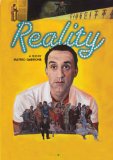| Reviews & Columns |
|
Reviews DVD TV on DVD Blu-ray 4K UHD International DVDs In Theaters Reviews by Studio Video Games Features Collector Series DVDs Easter Egg Database Interviews DVD Talk Radio Feature Articles Columns Anime Talk DVD Savant Horror DVDs The M.O.D. Squad Art House HD Talk Silent DVD
|
DVD Talk Forum |
|
|
| Resources |
|
DVD Price Search Customer Service #'s RCE Info Links |
|
Columns
|
|
|
Reality
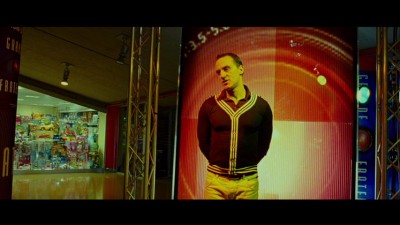
There's a swift, cutting satire to be had from the entirely believable, if extreme, example of pop-culture immersion and devotion that we witness in Reality, the latest film from Italian director Matteo Garrone. Garrone and his coscriptors have apparently used real events as the basis of their story, which involves a regular Italian men's inexplicable obsession with becoming a participant in a reality-TV show, and such a treatment for a movie, with a protagonist who's sucked into the appeal of that most often petty, competition-obsessed, and sensationalistic brand of TV programming, would seem to cry out for some sort of full-on satirical approach, whether harshly critical and mocking (as in Network or Gus Van Sant's prescient, pre-Survivor picture To Die For) or more gentle and affectionate (one can easily picture Christopher Guest and his company parlaying such a situation into some hilarious characters and riffs). But Garrone bypasses that wide-open door to take us down a much less obvious path: Reality is on the gentle and affectionate side, to be sure, but it's only satirical in the most incidental way, if at all. Garrone does something much less sharp (in the sense of being "pointed") than that, digging deeply and warmly into the experience of a character spellbound and then swallowed up, at least metaphorically, by the Big Brother House, and the film's unfailingly attentive, empathetic focus on this man, his family, and his needs -- as well as its avoidance of harping upon or singling out the Big Brother trend in television programming as some sure sign of cultural end times -- leads to something that, while often quite funny, is unexpectedly, convincingly sweet and humane.
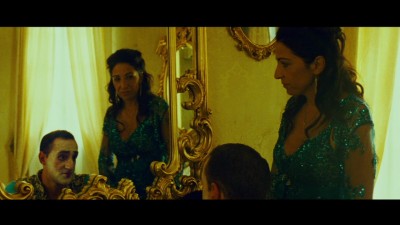
That kindly, observant, eventually rather melancholy feel to the film's tale, the reality-TV-auditioning misadventures of a Neapolitan fishmonger called Luciano, is due in large part to Garrone's inspired casting of brilliant first-time semiprofessional actor Aniello Arena (whose own story, delved into by the disc's extras, is interesting enough for a whole other movie) in the role. Luciano is a hardworking, slightly shady guy (he and his common-sensical wife, Maria (Loredana Simioli) run a small-time scam on the side, roping their neighbors into buying exoticized, overpriced pasta makers) who has perhaps a bit more than his share of attention-starvation, but who also has the guts and humility (and, just possibly, actual clowning talent) to get it: The first time we meet them, Luciano and Maria along with their contentious, squabbling, inelegant but loving extended family, are attending a raucous, fairly gaudy wedding at a hotel done up, Las Vegas-style, to simulate a "palace." It's an extended, relaxed, but lively sequence, this opening wedding party; it perfectly, subtly introduces us to Luciano, who fetes the bride and groom in a star-turn transvestite bit that's evidently his well-known trademark among his family, but is at one and the same time a randily loving husband to Maria and a good father who goes well out of his way to get an autograph for his little girl from the bona fide "star" guest at this reception, Enzo (Raffaele Ferante), a former contestant on and current spokesperson for the ultra-popular Grande Fratello, the Italian version of Big Brother. As he watches Enzo take off in a private chopper, undoubtedly destined for parts more glamorous and important -- somewhere where it's always as fun and frantic and joyously exciting as this tremendous wedding has been -- is that a look of longing we see in Luciano's eyes?
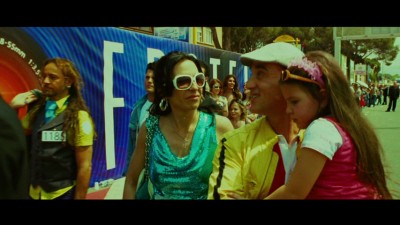
The return to their real lives from the hotel's fantasy environs is a letdown, as are most of our returns from holidays; this extended family's lives in half-gentrified old flats less palatial than a bumptious, homely struggle to get ahead. When Luciano gets the call from his brood, informing him that Big Brother auditions are going down at the anonymous upscale mall they frequent, he gets there as fast as he can and uses his rumpled-handsome comedic wiles (Arena is a wonderful physical presence for this agreeably forward character, and could easily establish himself as a distinctive comedic persona) to insinuate himself into the tryouts, subsequently even making it as far as the next round of eliminations, which Garrone renders splendidly evocative and resonant by setting it at Cinecitta, the famous Italian film studio (again, this is open, observant rather than sharp and critical; for better or worse, this really is today's idea of the star parade and the glamorous life, the La Dolce Vita of our time). But as he subsumes himself into the idea of reaching whatever utopia that helicopter was spiriting Enzo off to, Luciano becomes paranoid and obsessive, projecting the TV-focused part of his existence onto everything: Every unfamiliar visitor to his fish stand, every stranger, the whole world around him is watching his every move and judging it for Big Brother worthiness. As we've seen from the beginning of the film, Luciano's world is already one in which TV-bred fantasy and reality have begun to blur, and he's more than ready to step all the way into a delusional world that runs parallel to real life -- one that's full of all the excitement, fun, and purpose implied by "reality" TV's imposed narratives, which day-to-day work, bills, friends, and family (and, we're reminded, this being Italy, even the Church) fail to provide.
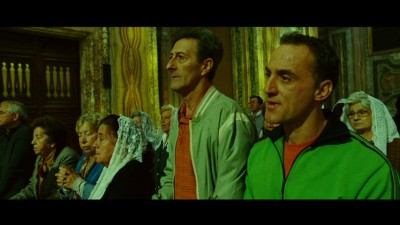
There's many a droll, sometimes even a quasi-slapstick (thanks to Arena's energy) moment in Reality, but if Garrone and Arena and their collaborators aren't out to make a didactically "serious" point about how tawdry and degrading our TV-culture has become, they're also not strictly here for the mirthmaking. As in his last, much darker film, 2008's Gomorrah, Garrone looks at his chosen (and, evidently, familiar) milieu through a DeSican lens, impelled to look at a people -- the jumbling-together working, middle, and poor classes of Naples -- straight, not out of pity or ideological obligation but out of simple, sincere love for them, warts and all. He's brought along Gomorrah's cinematographer, Marco Onorato, to make the film's images in a somewhat similar style to the prior one, with much hand-held/location-shot, immediate and loose stuff that will then hit unexpectedly, seemingly incidentally on extremely striking, meaningful compositions (a recurring visual motif in which Luciano is captured in some spot of glowing light, for example framed in bright spaces through doorways from a darkened room, or at the end of an alleyway, is just right for this cheerfully deluded man's desire to go into the light, towards some kind of TV heaven), with the important addition of brightly saturated colors, a hybrid Neorealist/melodramatic approach that suffuses every frame of gritty, worn-down, but venerable Naples with pockets of magic -- a reality rife, ribboned through, with its own glorious hints of candy-colored fantasy that might be perfectly sufficient were one not blinded by the million-watt glare of Big Brother.
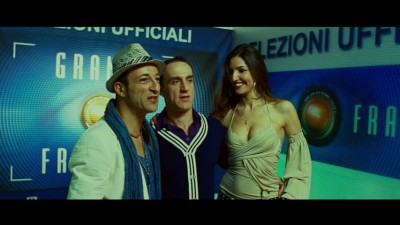
But "blinded" doesn't feel like exactly the right word to describe what happens to Luciano as he succumbs to what is ultimately a rather benign kind of madness. Arena and Garrone use their powers of characterization and visual persuasiveness to make it impossible, unthinkable that we would deride or dismiss Luciano, or fail to understand his desires, however trivial we might consider their specific manifestation. The film concludes on the most poignant note imaginable, replete as it is with real, unblinkered sympathy for Luciano's plight, which is nothing more than a pop-culturally facilitated crystallization of the restlessness most of us have felt as life has gone by and we cash our paychecks and pay our bills and take comfort in our families and wonder, sometimes urgently and overwhelmingly, if maybe there shouldn't be a little more to it. By the time we leave Luciano in the permanent throes of his happy illusions, whether or not he has every right to the pursuit of his imagining of a great life, whatever that might look like to him, is no longer a question. Our overriding concern, like Garrone's, is for this character's well-being, and the storyteller doesn't fail to notice, ever so gently, that the sort of escape Luciano seems to have pulled off is a mixed blessing, ambivalent at best: A word where dreams and reality are permanently fused by dint of sheer persistence and willpower (the fantasy proffered by reality programming) may be an inviting and cozy headspace to disappear into, but what do you have to give up to get there? And doesn't it get awfully lonely?
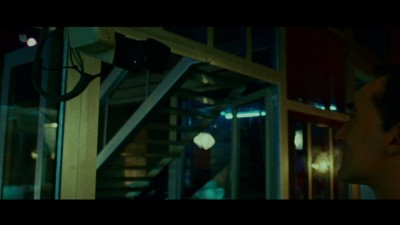
Video:
Reality arrives on DVD in a top-notch widescreen-anamorphic transfer (at its original theatrical aspect ratio of 2.35:1) that does full justice to cinematographer Marco Onorato's documentary-hand-held yet consistently color-(over)saturated evocation of the film's world, where the raw, lively struggles of daily life blur with the fantastical and delusional. Said colors are rich and vivid, more dimly-lit scenes or darker portions of the screen are solid, skin tones look great, and there's a very pleasing, healthy, film-like grain/texture left intact (no overuse of digital smoothing/DNR), with an only occasional, barely visible bit of edge enhancement/haloing the sole compression artifact noted.
Sound:The Dolby Digital 5.1 surround track (in Italian with optional English subtitles) is wide-ranging, multilayered, and supple, easily encompassing all dimensions of the film's sound from basic dialogue (immediately present and audible throughout) to Alexandre Desplat's delicate score to ambient/crowd noise and diegetic music (as in a raucous wedding-reception scene, or at the audition scene at a busy shopping mall) without a trace of distortion or imbalance at any point.
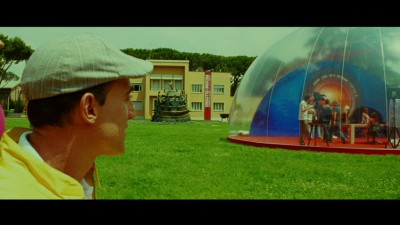
--An interview with writer/director Matteo Garrone (24 min.) in which, aided by the relevant on-set stills and clips from the film, he nimbly and informatively walks us through every layer of Reality, from his tricky basing of his script upon a true story to his reference points (films by De Sica in his more comic mode, for example) to his casting, shooting style, and an overall vision of striking a delicate satirical/humane balance that the film does end up achieving.
--"Dreams Are my Reality" (20 min.), a behind-the-scenes mini-documentary on the making of the film that offers a bounty of candid on-set interviews and hectic, fascinating moments of creation between Garrone, the actors, and the crew.
--"Inside Reality" (9 min.), another mini-doc that takes us deep into the processes -- scoring the film with composer Alexandre Desplat, creating the production design, and the minutiae of post-production work done on the images to create the final shots -- that took place apart from (before and after) the actual shoot.
--Four deleted scenes (total 10 min. approx.), mostly featuring further domestic scenes and clowning/character-development improv from Arena that in one way or another was superfluous to the final cut.
--A profile of actor Aniello Arena (14 min.) documents the most interesting story behind Reality: The casting of its immensely talented and appealing lead, a "nonprofessional" (not that you'd know it) who had never acted in a film before, whose training (and it evidently really was training, at a near-professional level) came at the unlikely hands of Italy's prison system. A now-rehabilitated former convict, Arena joined the acting club at Volterra prison, where he was incarcerated for years, where he played in such productions as Hamlet and The Threepenny Opera. This supplement doesn't have a whole lot directly to do with Reality (it has more direct relevance, actually, to Garrone's last film, Gomorrah, as it was participation in the Neapolitan mob life extensively depicted in that picture that got Arena imprisoned), but it's very nice nonetheless, telling us an additional, unsentimental but utterly humane true-life story about liberated talent and the possibilities of resuscitation, new paths, and second chances in life -- if society is willing to facilitate them.
--The film's U.S. theatrical trailer.
--An especially beautiful and well-designed fold-out cardboard package (the sleeve often being a highlight of an Oscilloscope DVD release) is nice and elaborate enough to be considered an "extra" as well.
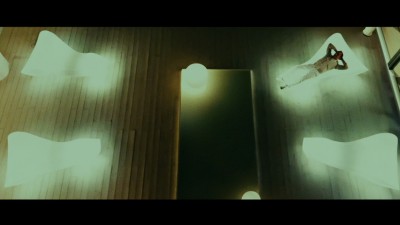
The idea of a kinder, gentler sort of satire seems counterintuitive, but maybe what looks at first blush to be the makings of a satire on reality-TV culture in Matteo Garone's Reality is ultimately peripheral, beside the point. For all its kindness and gentleness, the film works amazingly well, but not really as a satire; you soon forget that this seemed one of its potential impulses, and leave behind any of your own opinions about the frenetic foment of reality TV's competitions and instant "stars," because Garrone's emphasis is firmly and successfully on the kind of humanity in his protagonist, a Neapolitan fishmonger turned reality-TV aspirant named Luciano (the great comic discovery Aniello Arena), that those of us critical of reality TV feel is usually given short shrift by that genre. Luciano is goofy, probably misguided, and ultimately troubled, but Garrone and Arena make him, rough edges and weaknesses and all, immensely likeable and sympathetic. The same goes for his newfound, all-consuming life pursuit: In this context, which focuses on Luciano and his world rather than how silly or not is the impossible world he dreams of, his relaxing back, softly and deeply, into the paranoid-obsessive conviction that his life is being observed for worthiness of tele-visibility is just his own prosaic, extreme version of the shortcut to utopia most anyone has fantasized about at one time or another. There's a carefree, accepting, candy-colored irony to Garrone's story and visual approach, as well as a go-for-broke affability to Arena's presence, that don't allow Luciano to become an object of our pity, and that keep the film in the realm of comedy despite its subtly serious -- or at least uninhibitedly heartfelt -- humanism. But if there's something effectively droll about a working-class fish-seller's delusions of televised grandeur gradually taking him over, Garrone feels deeply enough for his haplessly unheroic hero, and is observant enough of the toll paid by him and those around him, that by the end the tragic and the comic elements have fused, and we find ourselves moved to a degree we could not have anticipated. The laughter Reality elicits is affectionate, not mocking, and the recognizable, possibly universal dreams and yearnings into which it offers such casual-seeming but wise insights make it a film whose powerful effect on us doesn't fade, but only grows, once we've stopped laughing and find ourselves still chewing on, still pondering the ambiguous, blissful yet lonely fate of poor, lucky Luciano. Highly Recommended.
|
| Popular Reviews |
| Sponsored Links |
|
|
| Sponsored Links |
|
|
| Release List | Reviews | Shop | Newsletter | Forum | DVD Giveaways | Blu-Ray | Advertise |
|
Copyright 2024 DVDTalk.com All Rights Reserved. Legal Info, Privacy Policy, Terms of Use,
Manage Preferences,
Your Privacy Choices | |||||||









